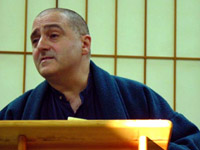- Sevan Ross
Infobox Buddhist biography
name = Sevan Ross

img_size = 170
img_capt =
landscape =
birth_name =
other_names =
dharma_name =
birth_date =1951
birth_place =New Kensington, Pennsylvania ,United States
death_date =
death_place =
nationality =
denomination =Zen Buddhism
school =Soto andRinzai
lineage = Harada-Yasutani
title = Priest
workplace =Chicago Zen Center
education =
occupation =
teacher =
reincarnation_of =
predecessor =
successor =
student =
spouse =
partner =
children =
website = [http://www.chicagozen.org www.chicagozen.org]Sevan Ross Sensei is a
Zen Buddhist priest with training backgrounds in both theSoto andRinzai traditions in theHarada-Yasutani lineage. He is currently director of theChicago Zen Center inEvanston, IL . He was born in New Kensington, Pennsylvania in 1951. He earned a B.S. in English from Indiana University of Pennsylvania and did graduate work in English andLinguistics at StateUniversity of New York at Cortland . He began Zen training in1976 and served for eight years as a priest and administrator at theRochester Zen Center . He was ordained as a Zen priest in 1992 by Roshi Bodhin Kjolhede and has trained under other teachers such asPhilip Kapleau ,Toni Packer . andJames Ishmael Ford . Most recently, he has completed the Harada-Yasutani koan curriculum with James Ford Roshi.Sevan Ross is a member of the
American Zen Teachers Association (AZTA) where he serves on the Membership Committee.As Director of the Chicago Zen Center, he offers the classic Zen training forms, such as
sesshin (meditation retreat),dokusan (private formal instruction), andteisho (formal Dharma talk). He is also involved with local colleges, yoga groups, and other organizations in offering Dharma teaching in venues outside the traditional temple settings.Ross is an outspoken advocate of
Vegetarianism , especially as seen in the context of Zen practice: “I was a member of theRochester Zen Center from, I think, 1977. The Rochester Zen Center has always emphasized vegetarianism, and within a year I made the identification with animals where I recognized that by consuming them, at some point in the process, I was harming others. I wasn't harming the one that I was consuming, because I couldn't see it die, but I knew it would be replaced by others. And when that realization hit me, it hit like a ton of bricks and I was a vegetarian within a week. I just stopped. I opened the refrigerator one day, I looked at that tuna salad, and I said ‘that's enough of this. I don't need to eat this.’ It's not like I lived in a place where you couldn't get decent food, it's easy, so I quit and I never looked back. My transformation was linked to the identity that whatever flesh food I'm eating is being replaced by another animal that is tortured in some way before being murdered to become the next flesh food meal. So I wanted to stop being part of that chain.”Sevan Ross’s view of the role of Zen Centers and
Zen teaching in our society is one of what he calls “immediate practicality.” He speaks of the need of temples to be available to people, responsive to people’s schedules, and tuned in to the society we now live in. At the same time, Zen Centers should “challenge their members to develop spiritually, and they should not become centers of entertainment or simply social interaction. Sensei Ross asserts that TheChicago Zen Center must be committed to serving its members in the urban area where it is located, and to this end retreats are held right at the temple in Evanston, a location available to all public transportation. Retreats and daily sittings are timed to mesh with members’ work schedules. Ross has also appointed three instructors to share in the teaching responsibilities at theChicago Zen Center , thus making instruction more available.He sees Zen Centers as places of intense training, both for residents and for the community of practitioners, or
sangha . TheChicago Zen Center concentrates on classic Zen training and sees itself as a community resource of deep, concentrated spiritual exploration. He comments: “While our forms are classic, we have a very open door to people of all stripes. About a third of our community speaks English as a second language. We welcome men, women, professionals, tradespeople, conservatives, liberals, gays, straights, young or old. But there is one common thread in what we do in this community – we don’t come here to simply get a pat on the back, no ‘now, now, there, there’ stuff here – we come together to go deep spiritually. Zen work is the most profound work we can do, and what we have in common in our community is the willingness to work deeply on ourselves.”ee also
*
Timeline of Zen Buddhism in the United States External links
* Chicago Zen Center: http://www.chicagozen.org
* Interview with Sevan Ross for Veggie Dharma: http://www.veggiedharma.org/wst_page4.htmlReferences
*cite book| last =Ford| first =James Ishmael| authorlink =| coauthors =| title =Zen Master Who?: A Guide to the People and Stories of Zen| publisher =Wisdom Publications| date =2006| location =| pages =215| url =| doi =| id = | isbn =978-0861715091
Wikimedia Foundation. 2010.
